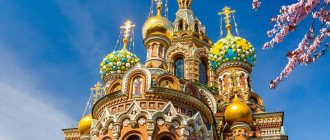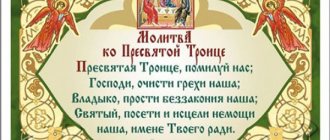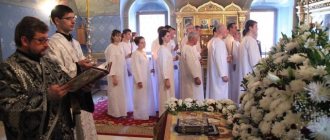Every year, according to Orthodox traditions, parents' Saturday is celebrated before the Intercession of the Most Holy Theotokos.
In 2022 it falls on October 9. A memorial service is held in the temple, during which funeral prayers are read. On such a day, it is customary to remember deceased relatives, and first of all, parents.
Prayer on Parents' Saturday for the deceased at home read the text on October 9, 2021 before the Intercession
There are several parental Saturdays throughout the year when Christians are remembered. Before the Intercession it is called Pokrovskaya. In churches you can leave notes with the names of deceased relatives, perform a memorial service, and light candles for the repose.
Parental Saturdays occupy a special place in the Orthodox church calendar. These are days dedicated to remembering the dead. They are held before major church holidays. Intercession Parents' Saturday is celebrated on October 9, 2022. Traditionally, people visit temples to pray for their deceased loved ones. However, it is not always possible to go to church. In this case, praying on Parents' Saturday for the deceased at home in front of the icons will help.
Reading rules
It is worth saying that there are no specific rules for reading such prayers. The main conditions are strong faith and sincerity. Only in this way will the cherished words touch God and the deceased. Don't be afraid of emotions or opening up your feelings. Be honest and speak sincerely. It is best to pray in front of holy icons, if there are any in the house.
Prayer on Parents' Saturday - a request sent to God for the soul of the departed
The best option is to read the prayer silently or in a whisper within the walls of the temple during a visit. Often the holy fathers advise coming to church during Parents' Saturday. You need to write a funeral card, which will list the names of all deceased relatives and close people.
On a note! On the day of each Parent's Saturday, special services are held in the church. This can be a separate memorial service or an Ecumenical one.
Why do they read prayers on Parents' Saturday?
Priests talk about the importance of sincere prayer. This is exactly what the soul of the deceased needs, who is no longer able to change his fate. Only the relatives and friends of the deceased can beg for him a pass to the Kingdom of Heaven.
There is an opinion among the people that supposedly children who do not pray for their deceased parents experience anxiety. The dead can come to them in dreams. Peace of mind returns after sincere prayers. This is why it is important to pray on Parents’ Saturdays.
Home prayer for deceased parents
How to correctly read a prayer for deceased parents at home, Father Vladimir Golovin said well: with love. The same applies to prayer work in general. Wherever we pray, we must try to follow this basic criterion.
Prayer is often called warm; such prayer will be like a warm cover not only for deceased parents, but also for the person praying.
A simple proofreading of a prayer text can be accepted by the Lord as condemnation, that is, it is not pleasing to God and will bring more harm and certainly no benefit.
Sometimes a short but heartfelt prayer will provide significant help to deceased parents than kilometers of prayer texts read for show.
History of the holiday - Intercession Parents' Saturday
Parents' Saturday of Intercession was established in honor of the soldiers who died in the battle of Kazan. The battles took place back in 1552 during the reign of Tsar Ivan the Terrible.
The dead soldiers were buried near the Kazan Kremlin. Today there is a monument to the Image of the Savior Not Made by Hands.
Only some dioceses celebrate Mother's Saturday of the Intercession:
- Kazan;
- Vyatskaya;
- Izhevsk;
- Ekaterinburgskaya.
Belarusians also have a similar holiday. They call it “Pokrovsky Dzyady”.
Parishioners of Orthodox churches believe that the souls of the dead visit the homes of loved ones, so they prepare a funeral dinner. Kutya, which is considered a ritual dish, is placed on the table. Raisins, poppy seeds and honey are added to the cereal.
Memorial traditions of parental Saturday
There are many traditions in Orthodoxy - one of them is the commemoration of the dead. In churches these days, memorial liturgies and memorial services are held, aimed at maintaining the memory of people who have left the earthly world, and liberation through prayers from the sins they once committed.
On Pokrovskaya Parental Saturday, over time, they began to remember not only fallen soldiers, but also their own deceased relatives - this tradition has been preserved to this day.
On Pokrovskaya Parents' Saturday, according to tradition, their deceased parents are remembered in church. On this day, people submit notes for the souls of deceased relatives to the priest, and also pray for the repose of their souls in the afterlife.
Those who for any reason were unable to attend church can pray for them at home by placing a candle for their departed in front of the icons.
Commemoration at the Divine Liturgy
Knowing when to remember the dead during the Divine Liturgy requires special attention. In addition to the submitted notes, you can and should pray on your own.
The names of deceased parents must be entered in a memorial book, a special book where names are written down for prayer for health and repose. It is also called a synodic or a diptych, there is no difference.
During the liturgy there are moments of intense remembrance of names, there are 4 of them in total. The first moment is part of the service, called proskomedia. At this time, the priest, pronouncing the names out loud, takes out particles from the prosphora for the dead and the living, which are then lowered into the chalice with Communion.
Together with the priest, we can mentally remember our deceased parents and not only them. The second time is when a special litany is pronounced, which means diligent prayer.
After the Gospel reading, the deacon comes out with the words: with all our hearts and with all our thoughts, and so on. At this moment, the priest reads a secret prayer with the remembrance of names.
The most important moment occurs after the consecration of the Holy Gifts. The priest takes the censer and says: a prayer dedicated to the Virgin Mary is sung about the Most Holy and Most Pure Most Blessed, Glorious Lady of our Theotokos, and then the heavenly world (saints) is enumerated. At this moment, we also pray for our deceased relatives, and then for the living, for we remember that with God everyone is alive.
The fourth commemoration takes place after Communion, the priest brings the Chalice into the altar, places it on the Throne, takes particles from the paten and puts them in the Chalice with the words: wash away, Lord, the sins of all those remembered here. At this time, we also remember the names of our deceased parents.
Intercession Parents' Saturday: what not to do on October 9
Orthodox priests say that following popular superstitions is a sin. One of the most common is considered to be “feeding the dead.” People brought drinks and food (usually sweets) to the graves. Some completely buried bread or the remains of other food in the ground.
However, the list of prohibitions does not end there:
- You cannot order a memorial service for an unbeliever or a person who voluntarily passed away;
- it is forbidden to speak badly or even think about the deceased;
- conflicts should be avoided.
Excessive grief is also not welcome. For Orthodox Christians, earthly death is not the end of existence; they believe in the eternal life of the soul. Therefore, parent's Saturday is the best time to pray and ask God for strength and patience.
What to bring to church on Parents' Saturday
At the parastas or at the funeral Divine Liturgy, you can submit notes of repose with the names of those who have died close to your heart.
And on this day, according to the old church tradition, parishioners bring food to church - “for the canon” (or “for the eve”). These are Lenten products, wine (Cahors) for celebrating the liturgy.
Bringing food to church - “on the eve” - is an ancient practice of performing general funeral feasts, that is, commemorating the dead.
According to tradition, the parishioners of the temple gathered a larger common table in order to all together remember the deceased people close to their hearts.
Now the church distributes the food that was collected at its own discretion. A certain amount of food is used to meet the needs of parishes, and the rest is distributed to the poor who receive help from the church. If there is still food left, it goes to beggars on the street.
By bringing food to church on Parents' Saturday, we serve our neighbors and remember our departed ones.
When people come to the funeral liturgy, they prepare special notes in advance with the names of all deceased relatives or loved ones. Then these notes are thrown into prepared urns or given to a priest who passes by with a container for notes.
What to choose: Many people doubt what is better, going to a cemetery or going to church? According to the church, going to a cemetery is perfectly acceptable if a person first attends a church service. It happens that people neglect visiting church and prefer to simply visit the graves of the dead. But in the afterlife, prayer and collective participation in the service are valued higher than cleaning the grave and communicating with the deceased at the monument.
Church funeral services
The deceased must be commemorated in the Church as often as possible, not only on designated special days of remembrance, but also on any other day. The Church makes the main prayer for the repose of deceased Orthodox Christians at the Divine Liturgy, offering a bloodless sacrifice to God for them. To do this, you should submit notes with their names to the church before the start of the liturgy (or the night before) (only baptized Orthodox Christians can be entered). At the proskomedia, particles will be taken out of the prosphora for their repose, which at the end of the liturgy will be lowered into the holy chalice and washed with the Blood of the Son of God. Let us remember that this is the greatest benefit we can provide to those who are dear to us. This is how it is said about commemoration at the liturgy in the Message of the Eastern Patriarchs: “We believe that the souls of people who fell into mortal sins and did not despair at death, but repented even before separation from real life, only did not have time to bear any fruits of repentance (such fruits could be their prayers, tears, kneeling during prayer vigils, contrition, consolation of the poor and expression in actions of love for God and neighbors) - the souls of such people descend into hell and suffer punishment for the sins they have committed, without, however, losing hope for relief. They receive relief through the infinite goodness of God through the prayers of priests and charity done for the dead, and especially through the power of bloodless sacrifice, which, in particular, the priest makes for every Christian for his loved ones, and in general the Catholic and Apostolic Church makes for everyone every day.”
An eight-pointed Orthodox cross is usually placed at the top of the note. Then the type of commemoration is indicated - “On repose”, after which the names of those commemorated in the genitive case are written in large, legible handwriting (to answer the question “who?”), and the clergy and monastics are mentioned first, indicating the rank and degree of monasticism (for example, Metropolitan John, schema-abbot Savva, archpriest Alexander, nun Rachel, Andrey, Nina).
All names must be given in church spelling (for example, Tatiana, Alexy) and in full (Mikhail, Lyubov, and not Misha, Lyuba).
The number of names on the note does not matter; you just need to take into account that the priest has the opportunity to read not very long notes more carefully. Therefore, it is better to submit several notes if you want to remember many of your loved ones.
By submitting notes, the parishioner makes a donation for the needs of the monastery or temple. To avoid embarrassment, please remember that the difference in prices (registered or plain notes) only reflects the difference in the amount of the donation. Also, do not be embarrassed if you did not hear the names of your relatives mentioned in the litany. As mentioned above, the main commemoration takes place at the proskomedia when removing particles from the prosphora. During the funeral litany, you can take out your memorial and pray for your loved ones. The prayer will be more effective if the one commemorating himself on that day partakes of the Body and Blood of Christ.
After the liturgy, a memorial service can be celebrated. The memorial service is served before the eve - a special table with an image of the crucifixion and rows of candlesticks. Here you can leave an offering for the needs of the temple in memory of deceased loved ones.
It is very important after death to order the sorokoust in the church - continuous commemoration during the liturgy for forty days. After its completion, the sorokoust can be ordered again. There are also long periods of commemoration - six months, a year. Some monasteries accept notes for eternal (as long as the monastery stands) commemoration or for commemoration during the reading of the Psalter (this is an ancient Orthodox custom). The more churches where prayer is offered, the better for our neighbor!
It is very useful on the memorable days of the deceased to donate to the church, give alms to the poor with a request to pray for him. On the eve you can bring sacrificial food. You cannot just bring meat food and alcohol (except for church wine) to the eve. The simplest type of sacrifice for the deceased is a candle that is lit for his repose.
Realizing that the most we can do for our deceased loved ones is to submit a note of remembrance at the liturgy, we should not forget to pray for them at home and perform acts of mercy.
How to properly remember the dead on Intercession Saturday
In order for our deceased loved ones to feel our support and prayerful help, we must learn to honor their eternal memory according to all the rules.
- You cannot submit memorial notes for the liturgy, as well as order memorial services, magpies and other specific services “for the remembrance of the soul” for unbaptized persons and suicides. All others can be remembered without restrictions.
- On the day of remembrance, one should behave quietly, modestly, in thoughts about the dead, in prayer for the salvation of their souls. You can and should visit the temple and attend the service.
- The most important thing for any deceased is commemoration at the proskomedia. Thus, the sins committed by the deceased are cleansed and atoned for by immersion in the blood of Christ, the great sacrifice. You should keep this in mind and submit a note on the day of remembrance to perform this ritual.
- It’s good to pray not only in church, but also at home. There are special prayers for the departed, and these must be read - always with attention, reverence and meekness in the heart.
- According to folk tradition, on days such as Intercession Parents' Saturday, one should take food to the temple or bake pies, buns, cookies, buy sweets and distribute all these delicacies to friends and strangers, especially children and neighbors. And it’s also useful for yourself, your family, to remember the deceased.
- Going to the cemetery on Memorial Day was also mentioned earlier. We can only add that it is better not to leave treats at the grave, as this is contrary to the Christian Orthodox tradition.
- It is better to take fresh flowers or a special wreath of artificial plants there, clean up, communicate with the deceased in peace, and pray for the repose of his soul.
Why do we need to pray for the dead?
It’s not often, but we hear from people: “Why pray for the dead, after all, the Lord Himself told us: “What I find, in that I will judge,” what is the meaning of such a prayer?”
Indeed, if these words of Christ are attributed to the moment of human death, then the funeral prayer has no meaning for anyone. But do we understand these words correctly?
This phrase does not refer to Scripture, but to an agraph written by the martyr Justin the Philosopher. It is consonant with the word of Scripture: “Watch therefore, because you do not know at what hour your Lord will come” (Matthew 24:42). This means that we are not talking about the fact that the Lord will find us with our death at one moment or another, but about something completely different, about the fact that we cannot indulge in carelessness. It is clear that the deceased can hardly be careless in the face of Eternity.
After death, according to the words of the holy fathers (Saints John Chrysostom, Cyril of Alexandria, Ignatius Brianchaninov and many others), the soul meets the angelic world (here both God’s angels and demons begin the struggle for the soul). This is the moment of contact of the soul with Eternity, but not the end yet.
The soul goes through ordeals, it takes some time. A private judgment begins for the soul, but this is not the final determination for a person, otherwise there would not be a Last Judgment at the Second Coming of Christ. The Lord gives time to the human soul for correction, but the whole sorrow is that the soul is not the whole person. It may be more difficult to sin without a body, but it is also more difficult to correct oneself without a body. But there is a way out of this!
The Apostle James commands us: “Pray for one another, that you may be healed” (James 5:16).
But it is not so much the body that needs healing, but the soul, because the source of all our illnesses is concentrated in it - sin. That is why the Church’s prayer for the deceased is effective, because it is a prayer for deliverance from the root cause of suffering - sin.
Our deceased relatives are not yet completely human, because man is a three-part being. Only then is a person human when the spirit, soul and body are alive. The dead are dead in body, although they are alive in soul, which means they have time to repent. And we, their still living relatives, loved ones, neighbors, simply brothers in Christ, can help them. Diligent prayer and generous alms can truly perform miracles. And the main miracle - the forgiveness of sins and the salvation of the soul happens unnoticed by us, but this does not make it lose its importance. After all, prayers for the repose of our souls will soon be very, very important to us.
Intercession Parents' Saturday, October 9: funeral prayers
Funeral prayers are not only helping the soul who has left the earthly world to achieve unity with the Lord, it is also a kind of tribute to respect and one of the ways to enlist the protection of the Higher Powers and good luck in life.
Any prayer is an appeal to God, which saves the soul, allowing you to get rid of the burden of pain, sadness and melancholy. Therefore, the spoken prayers will not only ease the path of the deceased, but they will help you come to terms with the bitterness of loss.
Prayer for the deceased
“Lord our God, let us remember the departed earthly servant (name), who transferred his soul to Heaven. Please forgive him for all the sinful acts that he committed, for we repent and for his soul in prayers we ask You, God, for Your mercy.
Give him relief from suffering and torment, give him a better life. Don’t let him go from you, let his soul be next to You forever. May his soul be illuminated with heavenly light. In the name of the Father, and the Son, and the Holy Spirit. Forever and ever. Amen".
Prayer for deceased children
“Our Father, Lord, we pray to You! In Heaven, my child (name) is next to You. Please give him care and comfort. Don’t leave him alone, take away all his earthly sorrows and torments.
By Your will You gave me a child and also took him into Your Kingdom! So illuminate him with your love and care! Cleanse his soul from despondency, for now he is with You forever. You are our King, our Creator, only by Your will do we walk on the sinful earth, and we will all give our souls to Heaven.
But until my time has come, take care of my child as you would all your children, for only You are able to give us comfort. In the name of the Father, and the Son, and the Holy Spirit. Amen".
Prayer for parents who left us
“Lord, hear our prayers for our parents who left this earth and went to Your Kingdom, where there is eternal life. Only You are able to console our grieving souls.
Please forgive all the sins of the deceased and give him life in joy and happiness in Heaven. I cry and pray for the soul of God’s servant (name) with faith and hope for consolation.
Don’t leave me alone in the sorrow of mourning, help me survive the loss. Forgive him all his sins, let his soul rest in peace and find eternal life.
I will pray for him and glorify Your name, our Lord! For you are our Father, and only you know when our last hour on earth will strike, in order to take our souls to the Kingdom of Heaven. May we find eternity next to you. Forever and ever. Amen".
Don’t forget about parenting days, when you become the support and support of loved ones who have passed away. On this day, your sincere prayers are especially important.
Funeral meal
The pious custom of remembering the dead at meals has been known for a very long time. But, unfortunately, many funerals turn into an occasion for relatives to get together, discuss news, eat delicious food, while Orthodox Christians should pray for the deceased at the funeral table.
Before the meal, a litia should be performed - a short rite of requiem, which can be performed by a layman. As a last resort, you need to at least read Psalm 90 and the Lord’s Prayer. The first dish eaten at a wake is kutia (kolivo). These are boiled cereal grains (wheat or rice) with honey and raisins. Grains serve as a symbol of resurrection, and honey - the sweetness that the righteous enjoy in the Kingdom of God. According to the charter, kutia must be blessed with a special rite during a memorial service; if this is not possible, you need to sprinkle it with holy water.
Naturally, the owners want to provide a tasty treat for everyone who came to the funeral. But you must observe the fasts established by the Church and eat permitted foods: on Wednesdays, Fridays, and during long fasts, do not eat fasting foods. If the memory of the deceased occurs on a weekday during Lent, then the commemoration is moved to the Saturday or Sunday closest to it.
You must abstain from wine, especially vodka, at the funeral meal! The dead are not remembered with wine! Wine is a symbol of earthly joy, and a wake is an occasion for intense prayer for a person who may suffer greatly in the afterlife. You should not drink alcohol, even if the deceased himself liked to drink. It is known that “drunken” wakes often turn into an ugly gathering where the deceased is simply forgotten. At the table you need to remember the deceased, his good qualities and deeds (hence the name - wake). The custom of leaving a glass of vodka and a piece of bread at the table “for the deceased” is a relic of paganism and should not be observed in Orthodox families.
On the contrary, there are pious customs worthy of imitation. In many Orthodox families, the first to sit down at the funeral table are the poor and the poor, children and old women. They can also be given clothes and belongings of the deceased. Orthodox people can tell about numerous cases of confirmation from the afterlife of great help to the deceased as a result of the creation of alms by their relatives. Moreover, the loss of loved ones prompts many people to take the first step towards God, to begin living the life of an Orthodox Christian.
Thus, one living archimandrite tells the following incident from his pastoral practice.
“This happened in the difficult post-war years. A mother, tearful with grief, whose eight-year-old son Misha drowned, comes to me, the rector of the village church. And she says that she dreamed of Misha and complained about the cold - he was completely without clothes. I tell her: “Are any of his clothes left?” - "Yes, sure". - “Give it to your Mishin friends, they’ll probably find it useful.”
A few days later she tells me that she again saw Misha in a dream: he was dressed in exactly the clothes that were given to his friends. He thanked him, but now complained of hunger. I advised to organize a memorial meal for the village children—Misha’s friends and acquaintances. No matter how difficult it is in difficult times, what can you do for your beloved son! And the woman treated the children as best she could.
She came for the third time. She thanked me very much: “Misha said in a dream that now he is warm and nourished, but my prayers are not enough.” I taught her prayers and advised her not to leave acts of mercy for the future. She became a zealous parishioner, always ready to respond to requests for help, and to the best of her ability she helped orphans, the poor and the poor.”
Source: www.pravoslavie.ru










